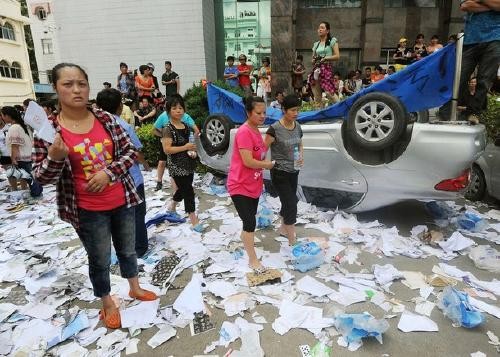
After the 地沟油 gutter oil and the 2008 melamine-contaminated baby formula scandal, a new food safety problem was discovered that turned into a new major food scandal in China.
A state-owned company used the same tankers to transport cooking oil and fuel. To safe costs, without a cleaning in between.
As the news spread via Beijing News and the social media platform Weibo, the government started a major censorship campaign.
The Chinese Communist Party is very careful with the topic of food safety, because it is a major reason for social unrest in the country. While the gutter oil scandal which exposed people re-using oil from sources up till the literal gutters to re-sell it to restaurants left people with disgust, the 2008 milk scandal was different.
It was exposed that Sanlu Group used the chemical melamine in all of their milk products including baby formula. It was used to make the product appear like it had more protein. But it also induced kidney problems up to kidney stones. At least six babies died.
The scandal got hotter as it was connected to the 2008 Sichuan earthquake. The Sanlu Group donated its products to victims of the earthquake and a mother of an injured child raised awareness online.
As the earthquake itself and the destruction caused by it was a very sensible moment for the ruling Communist Party, the melamine scandal was shaking the situation up to a new and new level.
Natural Catastrophes, Omens and the Right to Revolt
There is a reason that the ruling party is afraid not only of social unrest but of natural catastrophes in particular. It is not that the Chinese Communist Party believes to be in power forever. The party is paying close attention to reasons for unrest. Doing so in everyday life it is one thing, but there is a special belief in natural catastrophes as omens of change in rulership.
Whilst the government tries to archive 维稳 WÉIWĚN or social stability, there is an old belief dating back to ancient times and the Confucian scholar Mengzi. Mengzi (Mencius in the latinised version) is a philosopher with fascinating points of view on many aspects of live. Among them: Revolution.
Living ~ 371 – ~ 289 BC he gave Chinese thinking the right to revolt against rulers 革命 or revolution in modern words. The text passage where he talks about it, the book Mencius, is actually very short.
The concept includes the belief that rulers got the right to rule from the heavens. It is called the Mandate of Heaven (天命; pinyin: Tiānmìng literally ‘Heaven’s command’). And Mengzi added the aspect that the gods can withdraw that right. Reasons to revoke the right to rule are if the populace is not cared for. And natural catastrophes. They are seen as the gods sign for unjust rulers and it is time for a change.
During the Cultural Revolution (文化大革命
; pinyin: wénhuà dà gémìng), not long before Mao died, a major earthquake happened/occured in Tangshan (唐大地震
; pinyin: tángshān dà dìzhèn). And was, ironically, because the Cultural Revolution wanted to stamp out all the old believes, immediately interpreted as a sign..
Old Believes and Modern Forms of Counterinsurgency
The Communist Party still fears the one spark that starts the fire that will be able to threaten the government. As a socialist party, they depend on and fear the masses. As modern cybernetic rulers they rule on the base of technology as well as on techniques of counterinsurgency, of propaganda, of fear, and on nationalism. In the 1980s they discovered nationalism as a glue that will stick people together. As a heat that will make people forget the coldness of their existence and make them strike hard against “others” instead of fighting the rulership that put them in their miserable existence. This is how nationalism works, wherever it is used.
The social credit system, the sharp eye program, and others can be seen as new leafs on China|s surveillance and oppression tree.
If your are interested in more of my writing on Uprising, Riots, and Repression in China, there is a chapter in the Rowman and Littlefield’s “Riots and Militant Occupations” called “Kick It Like China: Riots, Action and Repression”.
There is more to the subject in my magistra thesis “The External Harmonization of Interior Uprisings – ‘Harmonious Society’ and ‘Mass Incidents’ in China” [in German].
And if you want to keep me writing, toss me a penny or more to support me.